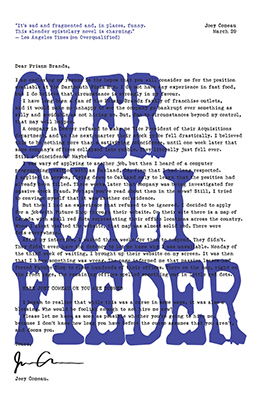 “I had never considered that you might miss a job like you missed a limb — a constant, reflexive thing. I hadn’t thought, as well as the obvious fears about money, and your future, losing your job would make you feel inadequate, and a bit useless. That it would be harder to get up in the morning than when you were rudely shocked into consciousness by the alarm. That you might miss the people you worked with, no matter how little you had in common with them.”
“I had never considered that you might miss a job like you missed a limb — a constant, reflexive thing. I hadn’t thought, as well as the obvious fears about money, and your future, losing your job would make you feel inadequate, and a bit useless. That it would be harder to get up in the morning than when you were rudely shocked into consciousness by the alarm. That you might miss the people you worked with, no matter how little you had in common with them.”
-Jojo Moyes, from the novel Me Before You
An existential crisis is typically a life event so destabilizing that it causes you to question the meaning of life, or at least your own life, identity, and personal worth. Such events might include a mid-life crisis, a divorce, the unexpected loss of a loved one, the loss of a job, or even, though perhaps to a lesser extent, an unwanted period of unemployment.
Since I’m talking to students, you’re all probably more sophisticated about the employment scene right now than me, who hasn’t had a “real” job since 2002. But as a digital nomad of the creative class I consider myself rather an expert on how to cope with fluctuating revenue, second guessing, and job searches that keep coming up empty.
So why might we call unemployment an existential crisis? Just a few reasons:
You don’t always see it coming. Even when you do see it coming you might have no idea how to respond.
Whether it is or not, it feels like rejection. You may wonder if you have any useful role in society. Your workplace may have felt like a family to you, and now that’s gone. You may need to change identities, e.g. from a student to a worker, from a worker to an unemployed person, from a worker in one field to a worker in another field, from someone who made a six-figure salary to one who makes five figures. All of this adjusting takes a great deal of mental and emotional energy.
North Americans of Northern European descent who are forced to stay with or move back in with their parents will face a social stigma and feel that they haven’t really grown up (just a little something extra to add to the identity crisis).
As a student you may have an even heavier load to carry. If you’re leaving school you might also be leaving behind an irreplaceable group of friends and a lifestyle that can never be repeated. Your identity also must now go through a series of shifts, from student to job seeker to employed, responsible adult.
You may have no savings left to you, and no credit, and you don’t yet qualify for employment insurance. Besides that, you’ve probably already squeezed dry everyone who might have been able to help you out financially.
So how do you get through unemployment with your sense of self and your sanity intact, at least until you find a job? Just a few suggestions:
- Talk to someone about it. Don’t look for advice, just seek out a good listener so you can talk your way through it. Sometimes solutions will come to you just as you’re laying the problem out for someone else.
- Stay focused. This doesn’t mean chasing your tail in circles, mulling over how hard life is and what a loser you must be. It means knowing what you want and concentrating your efforts on achieving it. My grandfather used to say to unemployed family members, “You do have a job; your job is to find a job!” Keep your chin up, keep your stick on the ice, and git‘er done.
- The job hunt itself should not take 40 hours a week. Yay! Now get out there in your spare time and do those amazing things you won’t be able to do when that job comes along with its potential to suck all the joy out of your life. I’m not talking idle pleasures here; rather, now’s your chance to do some volunteer work, join that band, learn a new language, or take up horticulture. Who knows? You might be able to find—or even create—a job out of your passion.
- Keep in mind that you are not your work. You are a precious manifestation of a great mystery. Now live like you believe that.
Uncertainty and a lack of resources often act as catalysts for positive change; an unknown future at times seems to draw good things into it. The world is full of success stories that start out with someone standing over the black pit of an unknown future. Do you suppose Don Cherry, Susan Boyle, Colonel Sanders, and J.K. Rowling would have achieved so much had they never endured long periods of unemployment? The world is your oyster; go make a pearl.


